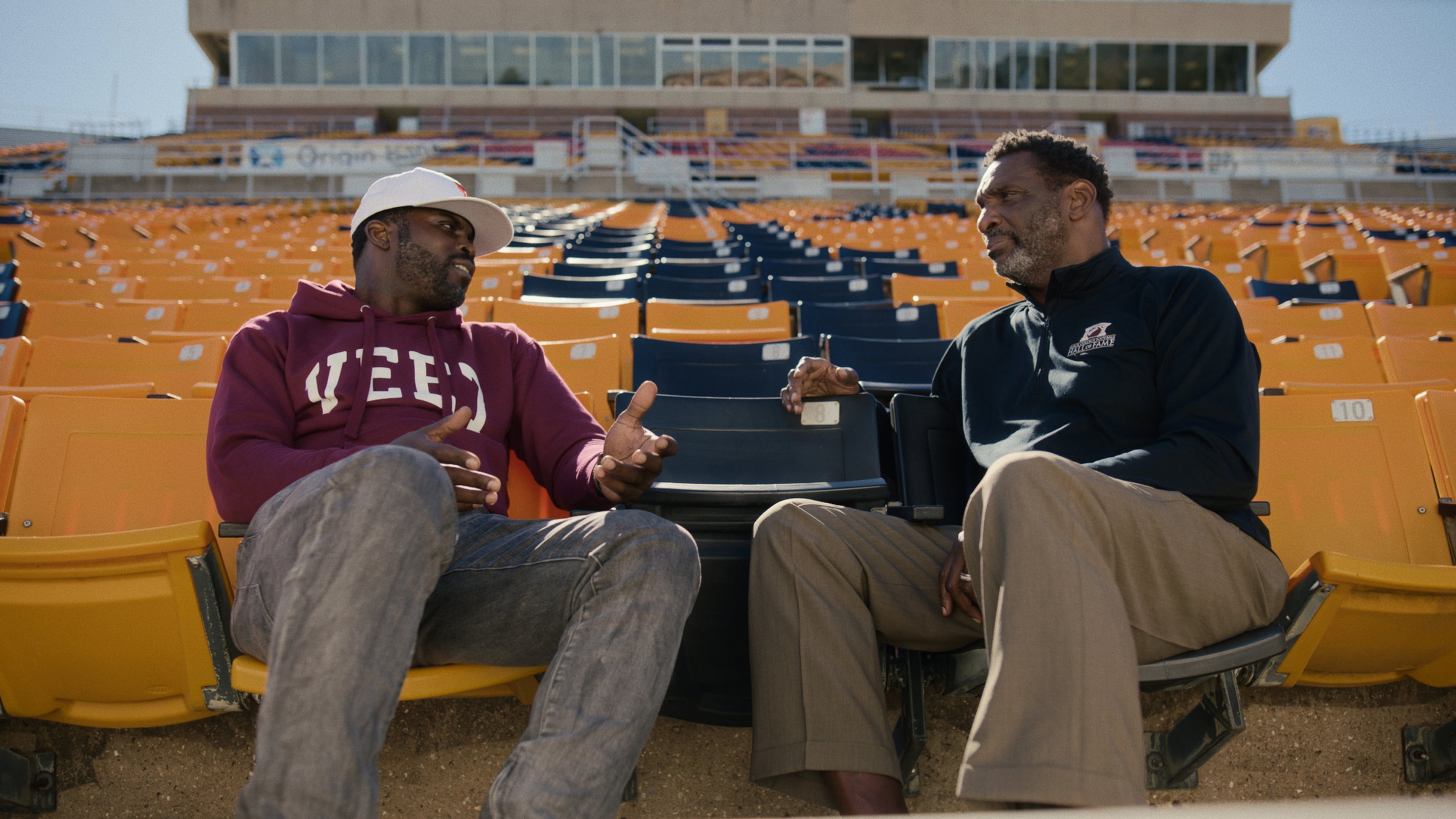Former Falcon Michael Vick’s new TV series explores history of Black NFL quarterbacks

On any given Sunday, Monday or Thursday in today’s NFL, chances are the quarterback is Black. This past weekend, 14 of the 32 Week 3 starting quarterbacks in the NFL were Black.
Quarterbacks Caleb Williams and Jayden Daniels, who are both Black, went first and second in the 2024 draft, and the Falcons surprised everyone by taking Michael Penix Jr., who is also Black, eighth. In the previous year’s draft, Black quarterbacks were selected at Nos. 1, 2 and 4.
By many accounts, the Atlanta Falcons played a critical role in establishing the NFL’s new norm when they became the first team to draft a Black quarterback first overall — Michael Vick in 2001. Time has proven that Vick wasn’t just a game-changing quarterback for the Falcons, but for the league itself.
Yet, as the three-part docuseries “Evolution of the Black Quarterback” on Amazon Prime Video shows, Vick didn’t do it alone.

The consistent praise Vick received for paving the way for Black quarterbacks planted seeds for the docuseries — which premieres today on Amazon Prime — the four-time NFL Pro Bowler said in an interview.
“People always come to me and say I changed the game (and) revolutionized the position,” Vick told The Atlanta Journal-Constitution via Zoom. To that, he said he’s had a standard response: “I appreciate you giving me credit for that, but have you heard of (Heisman Trophy-winning former Florida State University quarterback) Charlie Ward or (former NFL QBs) Warren Moon, Randall Cunningham or Doug Williams?’”
Vick said he has reflected on his place in the NFL history books. Those reflections were particularly present during the Super Bowl following the 2022 season. That game marked the first time that two Black quarterbacks — Kansas City’s Patrick Mahomes and Philadelphia’s Jalen Hurts — faced off in the iconic football game. While Vick acknowledged his own triumphs and shortcomings, the moment spurred him to pay it forward through this docuseries, he said.
“Some might remember me most as a quarterback who played in the NFL, who left it all on the field. Others as a man who made mistakes,” Vick said at the top of the first episode, referencing the dogfighting activities that ended his Falcons career and sent him to federal prison.

What follows is a vibrant and engaging history lesson that spans the nation. Among the many stops Vick makes in the filmed journey are Philadelphia, where Vick played after spending 21 months in prison; the National Museum of African American History and Culture in Washington, D.C.; the legendary Rose Bowl in California; as well as the college football mecca that is historically Black university Grambling State in Louisiana.
Dr. Todd Boyd (University of Southern California professor of cinema and media studies), Dr. Damion Thomas (sports curator at the National Museum of African American History and Culture), Steve Wyche (veteran on-air NFL reporter/commentator) and Jarrett Bell (longtime USA Today NFL columnist) are among the many experts who comment on the role that systemic racism played in Black quarterbacks’ decades-long exclusion from NFL play.
Collectively they shed light on such pioneers as Fritz Pollard, who played in the early stages of what is now the NFL, as well as the brief opportunities that hidden figures like Willie Thrower (one of the few Black starting quarterbacks in the pre-Super Bowl era) and Marlin Briscoe (the first Black quarterback to start a game in the Super Bowl era) received from NFL teams in the turbulent Jim Crow/civil rights era.
Testimonies from modern-era Black NFL quarterbacks such as Williams, Moon, James “Shack’ Harris, Donovan McNabb and Rodney Peete — as well as Super Bowl-winning coach and player Tony Dungy, who switched positions from quarterback to play in the NFL ― also drive this important docuseries. Along with his wife, Kijafa, Vick was joined on the project by “Good Morning America” host and Pro Football Hall of Famer Michael Strahan and his company, SMAC Productions.
“I just wanted to pay homage to those that came before me and give this generation a chance to hear the stories of these guys and the things they went through to just show how privileged and fortunate (today’s Black quarterbacks) are, and how fortunate I was to have guys come before me,” Vick said.

Vick’s role in cultivating this progress doesn’t go unnoted by those like Atlanta’s own Cam Newton, who made it to the Super Bowl following the 2015 season quarterbacking the Carolina Panthers. Newton publicly thanks Vick in the docuseries.
“I fought so hard to be a dual-threat quarterback,” said Vick, who starred at Virginia Tech before being drafted by Atlanta. “In 2005, I was on the cover of Sports Illustrated and I was telling people, ‘I am a quarterback.’ That was the title of the Sports Illustrated magazine (article).
“Now you have quarterbacks like Patrick Mahomes who are winning Super Bowls, and Lamar Jackson who are winning (league) MVPs, and Jalen Hurts (and) white quarterbacks like Josh Allen who play like me.”
That impact, he knows, wouldn’t be possible without the Falcons’ support. “I think (team owner) Arthur Blank did a tremendous job of getting the Atlanta fan base involved. We created, I think, one of the most dynamic atmospheres in football,” he said. “I’ve always appreciated the city of Atlanta.”
“I wish it could have lasted a little longer,” he added, “but I think some type of legacy remains.”
Ultimately, Vick hopes the docuseries shows that Black quarterbacks “all played an integral part in changing and revolutionizing the position.”
“That’s what I want everybody to see — that it wasn’t just me. It was all of us,” Vick said.

